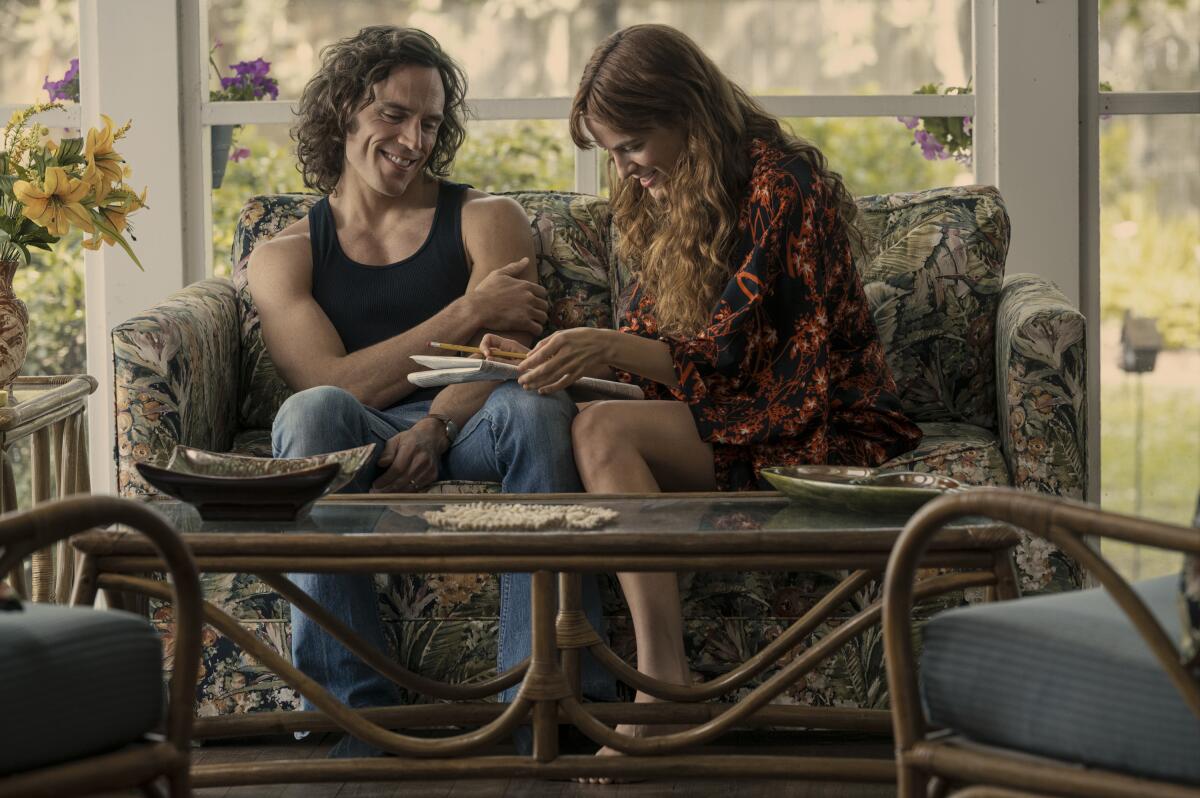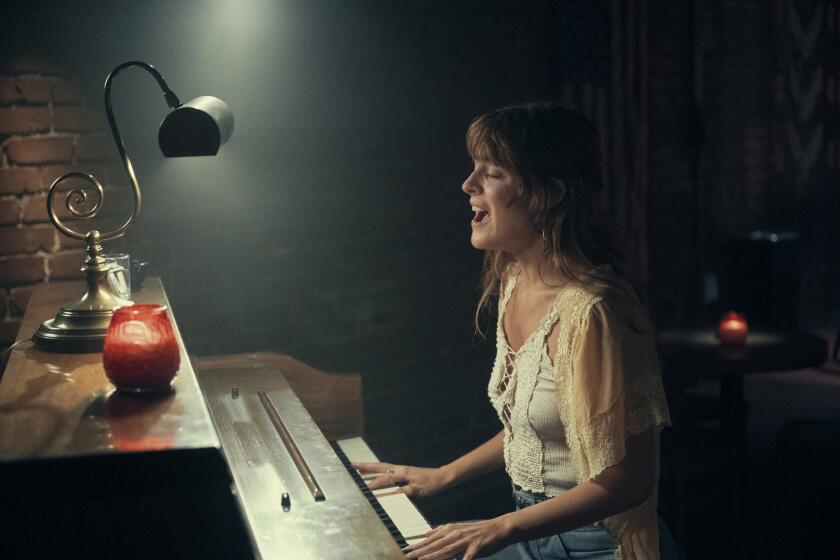How the team behind ‘Daisy Jones & the Six’ made a fictional band feel so real

- Share via
Sometimes dreams do come true.
In 2012, Scott Neustadter, then best known for his acclaimed screenplay (co-written with Michael H. Weber) for the beloved rom-com “(500) Days of Summer,” was set up on a general meeting with actor-producer Reese Witherspoon to discuss new film ideas. When asked to name his dream project, he said it would be to make Fleetwood Mac’s iconic album, “Rumours,” into a movie. Five years later, his pie-in-the-sky pitch — at least a more viable version of it — would be on its way to becoming a reality. That was when he was sent an unpublished manuscript of Taylor Jenkins Reid’s novel, “Daisy Jones & the Six,” which chronicled the rise and fall of a fictional, 1970s-era rock ‘n’ roll band à la Fleetwood Mac.
Neustadter loved the book and shared it with his wife, Lauren Neustadter, who had recently been made president of film and television for Witherspoon’s media company, Hello Sunshine. He predicted that both women would “flip” for the book — and they did. Thus began the journey to the screen for Reid’s evocative tale of the complex, often contentious dynamic between band’s co-lead singer-songwriters, Daisy Jones (played by Riley Keough) and Billy Dunne (Sam Claflin), the founder of the Six.
Although an array of producers vied for the rights to the book, only Hello Sunshine saw it as a television series and not a feature film. “I’ve done a handful of adaptations of novels, and really the piece of material tells you what it should be in a way,” says Scott Neustadter, the Prime Video show’s co-creator (with partner Weber) and co-showrunner (with Will Graham) in an April interview on Zoom. He was joined in the buoyant chat by executive producer Lauren Neustadter and Nzingha Stewart, a director and co-executive producer on the series.
The Amazon Prime Video series is a rock ’n’ roll soap opera that’s not exactly based on Fleetwood Mac.
Scott Neustadter, an Oscar nominee for his script (with Weber) of “The Disaster Artist,” continues, “Initially, I read this [book], and I was like, ‘I can definitely see 13 hours of amazing TV here.’” (It was ultimately a 10-episode series.) He adds, “I also felt like the ending, though it’s closed-ended and it does answer all your questions, on the way out the door it asks some new questions. So there’s an opportunity to keep telling the story if that was something that people were interested in.”
Regarding specific parallels to Fleetwood Mac, it’s widely agreed that the band in the novel — and the series — is more an amalgam of various 1970s musical groups. “I think that one of the things that we learned through the process of working really closely with Taylor is how much research she did,” says Lauren Neustadter. “Not just about Fleetwood Mac, but about all the bands of that era. And how many amazing stories there were that inspired her to create these amazing original stories and connections. It’s what makes the tapestry so magnificent.”

Still, as in any novel-to-series transfer, significant expansion and reimagining were required, while staying true to the author’s vision. “What’s cool about the book is that it’s written as this oral history, as interviews of people looking back on this time in their lives,” says first-time TV writer Scott Neustadter. “There are references to moments, but the moments are not there. The scene doesn’t exist. So we had to kind of invent whole cloth a lot of the scenes and moments that were [only] referred to.”
For Stewart, joining the “Daisy Jones” family was a chance to reunite with Lauren Neustadter, for whom she’d directed episodes of two previous Hello Sunshine series: Hulu’s “Little Fires Everywhere” and Netflix’s “From Scratch.” In addition, it was an opportunity to work with one of her “favorite writers,” Scott Neustadter.
In Screen Gab No. 73, we ask the co-creator of ‘Daisy Jones & the Six’ about creating a fictional Fleetwood Mac, offer weekend recommendations and more.
“I don’t know if you know this,” jokes Stewart, “but I am Black. So, I wasn’t raised on Fleetwood Mac. I tangentially knew [them], because I love music, but the myth of the band and the folklore isn’t something I grew up with. But I read Scott’s script, and it was exactly what I like about his writing.” Explains Stewart, “He writes human beings being human. He shows them so much grace. And they’re allowed to make mistakes and still be people and be seen as worthy and beautiful.” Stewart went on to direct four episodes of the show.
Lauren Neustadter especially wanted Stewart on the project because of the helmer’s early-career experience shooting music videos for such artists as Common, Eve, Jay-Z and 50 Cent. “It was just this really natural, organic thing to talk about having Nzingha join us for the back half of the season,” says Lauren Neustadter. “[That’s when] the band really is becoming the biggest band in the world and we’re doing all these amazing performance sequences.” She adds, “I think the way we are tracking both the characters and performances and bringing them to life [at that point] is such a testament to what Nzingha did.”
As with so many film and TV productions, the “Daisy Jones” shoot was substantially delayed due to COVID-19 restrictions. Although it was slated for an April 2020 start, shooting didn’t begin until September 2021. But the downtime was not wasted. “We had the gift of being able to slow down a little bit,” says Lauren Neustadter.
“We were not racing. We were all actually walking together, arm in arm, and asking the right questions and pausing and having these conversations [about story and character].” She recalls, “But also, these actors didn’t bail to go do other shows. They actually spent the pandemic learning how to play these instruments and sing and do what was required of their characters. They really became a band. It was really a singular experience and a miraculous thing to behold.”
More to Read
From the Oscars to the Emmys.
Get the Envelope newsletter for exclusive awards season coverage, behind-the-scenes stories from the Envelope podcast and columnist Glenn Whipp’s must-read analysis.
You may occasionally receive promotional content from the Los Angeles Times.







